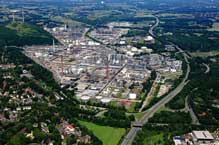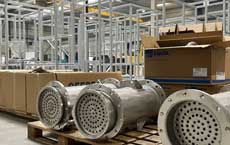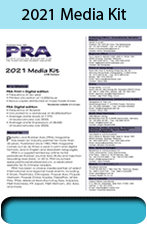Tie-ups: BP and Sabic collaborate on use of recycled plastics in Germany; Biofabrik and Enespa to build the “biggest facility” for plastic recycling in Germany

Oil firm BP and materials company Sabic have tied up to work together to drive circular economy in the petrochemical activities at the Gelsenkirchen (Germany) chemical complex. Building on a long established relationship between the two companies at the production site, the new collaboration will help to increase production of certified circular products that take used mixed plastics to make feedstock, thereby reducing the amount of fossil resources needed in the petrochemical plants at the site.
Certified circular polymers are part of Sabic’S Trucircle portfolio and are produced using advanced recycling to convert low quality mixed and used plastic, otherwise destined for incineration or landfill, into pyrolysis oil. The oil, which acts as an alternative feedstock to traditional fossil materials, will be processed at BP’s Gelsenkirchen refining site and then used by Sabic in its Gelsenkirchen polymer plants to produce certified circular products. The final material has identical properties to virgin-based polymers and allows plastics to be recycled over and over again, with no loss of properties or characteristics. After successful trials in December 2020, polymer production using the alternative feedstock started at the site early this year.
BP and Sabic have a collaboration going back decades in petrochemicals at the Gelsenkirchen site, which is the starting point for the value chain of the chemical industry’s network in the northern Ruhr Area. The refining and petrochemicals site in Gelsenkirchen plays an important role within the chemical industry in North Rhine-Westphalia, Germany’s most populous state. bp operates one of the largest olefin plants in Germany, with a production capacity of around two million tonnes.
“This is an important milestone in our vision of achieving up to 30% of our ethylene and propylene production from sustainable, recyclable raw materials by 2030,” says Wolfgang Stückle, Vice President Refining and Specialities Solutions Europe & Africa at BP.
The certified base chemicals from bp and the certified circular polymers from Sabic are recognised through the International Sustainability and Carbon Certification plus (ISCC+) scheme that certifies content and standards across the value chain from source to end product. The ISCC+ certification works on what is known as a ‘mass balance system’, meaning that for each tonne of circular feedstock fed into the cracker and substituting fossil-based feedstock, a tonne of the output can be classified as circular.

Meanwhile in other news, Biofabrik and Swiss firm Enespa AG have unveiled their plan to build the biggest facility for plastic recycling made of modular pyrolysis plants. The first WASTX Plastic unit will begin its operation in the spring and over the next few years the location will gradually be scaled to reach a capacity of several hundred tonnes/day. And due to stocks and bonds issued by Enespa, everybody can participate, said the company.
The teams of Biofabrik and Enespa have been working together for more than ten years, and at present they are working on building a plastic recycling factory in Germany capable to process several hundred tonnes/day of plastic waste, with Biofabrik as a technology provider and Enespa as financier and operator.
The WASTX Plastic is a modular plastic recycling unit and due to its unique design and technical features, it is said to be easily scalable, which provides the opportunity to recycle as much plastic waste as the location requires, starting from 1,000 kg daily (one P 1000 unit). The decentralised model brings the solution for plastic pollution directly to the place where plastic waste is collected. Even though the Covid-19 crisis has made it a lot more complicated to commission the project, it is expected to be take place in late March this year.
The companies said they are at the test phase of the first P 1000 module of the WASTX Plastic, which processes up to 1,000 kg of plastic daily. After this is completed, it will be scaled up and a factory built near Dresden.
·(PRA)
Subscribe to Get the Latest Updates from PRA Please click here
©2021 Plastics and Rubber Asia. All rights reserved.

©2020 Plastics and Rubber Asia. All rights reserved.
Home Terms & Conditions Privacy Policy Webmail Site Map About Us













